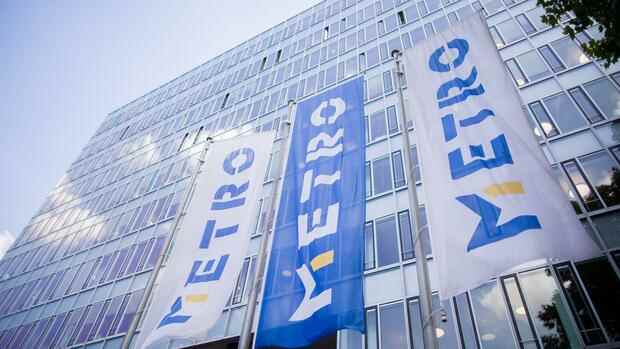The wholesale group is also active in Ukraine with 26 stores.
(Photo: dpa)
Dusseldorf The Franconian automotive supplier Leoni currently employs around 7,000 people in the Ukraine – and the smoldering conflict with Russia shouldn’t change that. “From our point of view, the country scores with its proximity to our European customers, a well-developed infrastructure, qualified workers and a comparatively favorable wage cost structure,” emphasizes the company.
The Ukraine is a comparatively small but attractive foreign trade partner for Germany. With a good seven billion euros from exports and imports, the Eastern European country only ranks 43rd according to the Federal Statistical Office. For comparison: German companies do business with Russia (14th place) worth almost 45 billion euros.
Nevertheless, the Ukraine is an interesting location for German companies – despite years of unrest and the ongoing threat of war. According to estimates by the German-Ukrainian Chamber of Industry and Commerce, around 2,000 companies with German participation are active in the country, which have created around 50,000 jobs.
And there could be more: Alexander Markus, Managing Director of the Chamber, reports that in the past three months he has received more serious investment inquiries from German companies than he has in years. However, he does not give specific examples.
Top jobs of the day
Find the best jobs now and
be notified by email.
From his point of view, a possible escalation of the conflict would not prevent German companies from doing business. The Ukraine attracts with affordable skilled workers, and the country with 44 million inhabitants also offers a relevant sales market, explains Markus. Apart from the Corona year 2020, GDP has been growing steadily between two and three percent since 2016.
>> Read here: US sees signs of preparations for Russian attack – Biden: “The risk is very high”
Medium-sized automotive suppliers in particular, which are well represented in the Ukraine, will benefit from this. Companies like Leoni from Nuremberg and Kromberg & Schubert or Prettl from near Stuttgart have therefore even expanded their local capacities. Leoni, for example, now manufactures wiring systems for cars and commercial vehicles at two locations in the Ukraine, which are in regions close to the EU border.
German companies in Ukraine are not panicking
The Lower Franconian gypsum manufacturer Knauf operates a plant in the Donbass region near the conflict line in the east of the country. It’s been running “so far without restrictions” and supplies the local market with building materials, says Jörg Schanow, Managing Director for Human Resources and Legal. With a view to the current situation, he adds: “We are prepared for all eventualities.”
Like the large family business, the local companies have adjusted to different scenarios, reports foreign trade expert Markus. “We feel the excitement above all outside the country, less inside.” The companies in the region are used to the uncertainty since the Crimean crisis in 2014, “for them that is part of risk management”.
Metro is also committed to the Ukraine location. The wholesale group has 26 stores there and employs 3,400 local employees, who recently generated sales of 790 million euros. According to a spokesman, business in Ukraine has “continuously developed positively” in recent years. “We see good potential for further growth in the country.”
Other Dax companies such as Bayer are also on site. The Persil manufacturer Henkel has been active in the Ukraine for 20 years and, with 500 employees, generates around one percent of its group sales there. The chemical giant BASF has meanwhile withdrawn its German employees. After the federal government called on German citizens to leave Ukraine, it was said that this had to be done for insurance reasons.
All companies report that they are prepared for an escalation with emergency plans.
More: Current developments in the Ukraine-Russia conflict in the news blog
